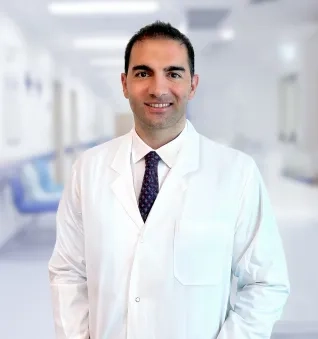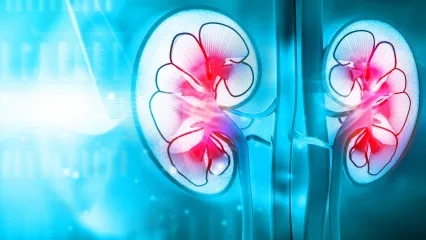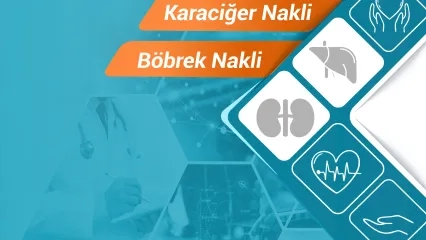Alo Yeditepe
Alo Yeditepe
19 Years Old Davut MİNAZ, Who Lost 45 Kilos in 4 Months, Clung to Life with His Father's Kidney
Davut MİNAZ, 19, who lives in Sultanbeyli, Istanbul, was diagnosed with kidney failure in January at the hospital where he was admitted with dizziness and vomiting. MİNAZ, who underwent dialysis three days a week, lost up to 45 kilograms in 4 months and his psychology deteriorated. Davut needed a kidney transplant and his father became a donor. However, considering the health of his 45-year-old father, Davut did not accept the transplant at first. MİNAZ, whose condition worsened gradually, was finally convinced and the kidney taken from his father was transplanted. MİNAZ, who regained his health after the successful operation performed by General Surgery Specialist Assoc. Prof. Dr. Veysel UMMAN and his team, said, "I was about to lose hope. But thanks to my doctors, I overcame my fears and regained my health today."
Davut MİNAZ, who shared the happiness and experience he experienced today after difficult days, continued his words as follows: "The dialysis process was very difficult for me both psychologically and socially. Being on dialysis for four hours three days a week is really hard for a young person. I could not go out, I was having seizures after dialysis. My life changed after I came to this hospital."
"I Feel Like I Could Run If They Let Me"
Emphasizing that he felt very good after the operation, MİNAZ said, "Before the transplant, I was having terrible dreams. My psychology was broken, there was a fear that I would lose my life. Now I feel like I can run if you let me go. Thanks to organ donation, I held on to life again. I would like to thank all my teachers who contributed to the transplant team."
İdris MİNAZ, "Please do the surgery, save my child"
Explaining the difficulties they have been going through since his son was diagnosed, Father İdris MİNAZ, a plasterer master, said, "We learned about the disease four months ago. Blood and urine tests were done everywhere we went. Only dialysis was recommended. During the dialysis process, my child became weaker and weaker. My son was afraid for me, but I said ‘never be afraid’. I said ‘operate on me, save my child’. After the transplant, I became 10 years younger. I live for my child and he will live for me. In this process, knowing that he has a piece of his father, he will protect it."
Assoc. Prof. Dr. UMMAN: “Kidney Failure in the Patient Progressed at a Rare Rate”
Yeditepe University Kosuyolu Hospital Organ Transplant Center Supervisor Assoc. Prof. Dr. Veysel UMMAN, who performed the transplant surgery, stated that kidney failure in MİNAZ progressed at a rare rate and gave the following information: "Generally, kidney failure occurs at advanced ages. However, some immune system diseases, infections or congenital problems can cause rapid progression in children. In our patient, kidney functions were rapidly lost as a result of a damage we call 'focal segmentary glomerulosclerosis' and he had to go on dialysis."
"The patient had given up hope"
Speaking about the general picture of the patient in the first evaluations, Assoc. Prof. Dr. UMMAN said, "When Davut came to us, he was very weak, had low energy and weighed about 45 kg. He was also psychologically frustrated, he had stopped taking care of himself. However, after we gave him information about the process, he became hopeful and his motivation increased." Reminding that recipient and donor surgeries are planned and performed at the same time in Kidney Transplant surgeries, Assoc. Prof. Dr. UMMAN said, "These coordinated surgeries continue for about 5-7 hours. At this point, it is critical that the kidney is removed and transplanted immediately."
"It has a vital importance not to postpone the transplant"
Emphasizing that the transplant process is more challenging in weak and malnourished patients, UMMAN underlined that the transplant process should not be postponed and gave the following information: "It can be difficult to implant a kidney in a 40 kg person. We face several problems in a patient with low weight and inadequate nutrition. Both in terms of the operation and in the post-operative period, it takes some time for weak and malnourished patients to recover and feel good in general. For example, when placing a kidney in the body of a 40 kg person, it can also be a problem for that kidney to fit there and to be in a comfortable space there.
As a matter of fact, the abdominal wall was quite small in our patient, which made it a bit difficult for us, but we saw that the kidney was working well without any problems with the controls we made after the operation. Therefore, it is vital not to postpone transplantation but to do it at the earliest possible time. The tendency in the world is not to postpone the transplant in this direction, but to perform the transplant as soon as possible after the development of end-stage renal failure, when the person loses these kilos and feels good without collapsing metabolically. "
Davut MİNAZ "Those who want a transplant should not be afraid"
Addressing other patients struggling with kidney failure, MİNAZ said, "I got a transplant, I am very happy. My life has changed and I think it will change even more. I will only use my medications regularly. I am telling those who want to get a transplant; don't be afraid. A very happy life awaits you. If I feel well after resting and taking my medication, I will work. I want to work even now, but my teachers do not allow me to do so yet."
Stating that he was in good health after becoming a donor, İdris MİNAZ expressed his feelings as follows: "I was discharged in 3 days after the surgery. We are now in the follow-up process. When my doctors say that I can work, I will be able to return to my same job. Therefore, people should not be afraid of being a donor for their loved ones."
"Free application can be made to all Organ Transplant Centers"
Pointing out the importance of early diagnosis, Assoc. Prof. Dr. Veysel UMMAN said, "It is necessary to recognize kidney damage at an early stage and intervene before it reaches the final stage. Patients who need transplantation can apply to all organ transplant centers free of charge, regardless of state or private. The process should be started by getting information without wasting time."
This content was prepared by Yeditepe University Hospitals Medical Editorial Board.
”
See Also
- Fall from Height Led to Kidney Failure, Saved by Sister's Donation
- What is a Liver Transplant, How is it Done? and Who is it For?
- Journey of Hope from Georgia to Turkey: 63-Year-Old Father Donates Kidney to Son
- Birthday Gift Becomes a Gift of Life: Kidney Donation from Husband of 20 Years
- Can Liver Cancer Be Prevented?
- Common Misconceptions About Kidney Transplantation
- What are the Problems Requiring Gallbladder Surgery?
- Gallbladder Surgery is a Necessity, Not a Choice
- What is Organ Donation?
- Liver Cancer (Tumor) and Treatment
- What is a Kidney Transplant?
Alo Yeditepe




